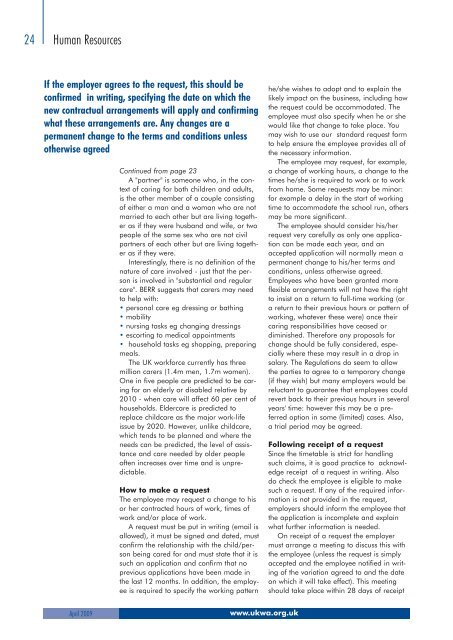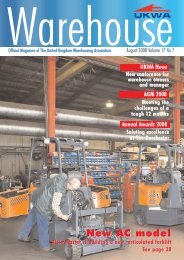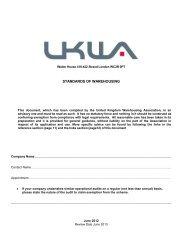ukwa 2 cover - United Kingdom Warehousing Association
ukwa 2 cover - United Kingdom Warehousing Association
ukwa 2 cover - United Kingdom Warehousing Association
Create successful ePaper yourself
Turn your PDF publications into a flip-book with our unique Google optimized e-Paper software.
24 Human Resources<br />
If the employer agrees to the request, this should be<br />
confirmed in writing, specifying the date on which the<br />
new contractual arrangements will apply and confirming<br />
what these arrangements are. Any changes are a<br />
permanent change to the terms and conditions unless<br />
otherwise agreed<br />
Continued from page 23<br />
A "partner" is someone who, in the context<br />
of caring for both children and adults,<br />
is the other member of a couple consisting<br />
of either a man and a woman who are not<br />
married to each other but are living together<br />
as if they were husband and wife, or two<br />
people of the same sex who are not civil<br />
partners of each other but are living together<br />
as if they were.<br />
Interestingly, there is no definition of the<br />
nature of care involved - just that the person<br />
is involved in "substantial and regular<br />
care". BERR suggests that carers may need<br />
to help with:<br />
• personal care eg dressing or bathing<br />
• mobility<br />
• nursing tasks eg changing dressings<br />
• escorting to medical appointments<br />
• household tasks eg shopping, preparing<br />
meals.<br />
The UK workforce currently has three<br />
million carers (1.4m men, 1.7m women).<br />
One in five people are predicted to be caring<br />
for an elderly or disabled relative by<br />
2010 - when care will affect 60 per cent of<br />
households. Eldercare is predicted to<br />
replace childcare as the major work-life<br />
issue by 2020. However, unlike childcare,<br />
which tends to be planned and where the<br />
needs can be predicted, the level of assistance<br />
and care needed by older people<br />
often increases over time and is unpredictable.<br />
How to make a request<br />
The employee may request a change to his<br />
or her contracted hours of work, times of<br />
work and/or place of work.<br />
A request must be put in writing (email is<br />
allowed), it must be signed and dated, must<br />
confirm the relationship with the child/person<br />
being cared for and must state that it is<br />
such an application and confirm that no<br />
previous applications have been made in<br />
the last 12 months. In addition, the employee<br />
is required to specify the working pattern<br />
he/she wishes to adopt and to explain the<br />
likely impact on the business, including how<br />
the request could be accommodated. The<br />
employee must also specify when he or she<br />
would like that change to take place. You<br />
may wish to use our standard request form<br />
to help ensure the employee provides all of<br />
the necessary information.<br />
The employee may request, for example,<br />
a change of working hours, a change to the<br />
times he/she is required to work or to work<br />
from home. Some requests may be minor:<br />
for example a delay in the start of working<br />
time to accommodate the school run, others<br />
may be more significant.<br />
The employee should consider his/her<br />
request very carefully as only one application<br />
can be made each year, and an<br />
accepted application will normally mean a<br />
permanent change to his/her terms and<br />
conditions, unless otherwise agreed.<br />
Employees who have been granted more<br />
flexible arrangements will not have the right<br />
to insist on a return to full-time working (or<br />
a return to their previous hours or pattern of<br />
working, whatever these were) once their<br />
caring responsibilities have ceased or<br />
diminished. Therefore any proposals for<br />
change should be fully considered, especially<br />
where these may result in a drop in<br />
salary. The Regulations do seem to allow<br />
the parties to agree to a temporary change<br />
(if they wish) but many employers would be<br />
reluctant to guarantee that employees could<br />
revert back to their previous hours in several<br />
years' time: however this may be a preferred<br />
option in some (limited) cases. Also,<br />
a trial period may be agreed.<br />
Following receipt of a request<br />
Since the timetable is strict for handling<br />
such claims, it is good practice to acknowledge<br />
receipt of a request in writing. Also<br />
do check the employee is eligible to make<br />
such a request. If any of the required information<br />
is not provided in the request,<br />
employers should inform the employee that<br />
the application is incomplete and explain<br />
what further information is needed.<br />
On receipt of a request the employer<br />
must arrange a meeting to discuss this with<br />
the employee (unless the request is simply<br />
accepted and the employee notified in writing<br />
of the variation agreed to and the date<br />
on which it will take effect). This meeting<br />
should take place within 28 days of receipt<br />
April 2009<br />
www.<strong>ukwa</strong>.org.uk

















